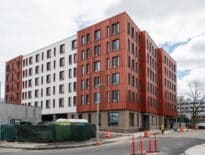
David Bates
When it comes to critiquing Boston’s housing supply, I’m no rookie.
In fact, in that particular arena, I might be Bobby Orr.
From 2012 to 2015, I wrote a weekly column in a popular blog (now defunct), where I often noted the very public symptoms of the Hub’s housing shortage.
One of my favorites, posted in 2014, was headlined, “Boston, it’s time to admit you have an inventory problem.” It was an imagined intervention with the city, to get it to understand what its zoning was doing to its citizenry.
It’s a decade later, and it seems the city is ripe for another expression of serious concern regarding the handling of its housing supply.
After all, now the housing shortage is a full-blown crisis. While residents are paying princely sums to live in Boston, many who can’t afford to pay Boston’s housing piper are leaving. These folks could be teachers, cleaners, nannies – or even professionals or doctors.
Big Results from Small Packages
Does your heart break when you hear that? Mine does. It’s certainly not something you’d expect to happen in John Winthrop’s City Upon a Hill.
Then, on Feb. 2, 2025, the state passed zoning that would provide some help to the housing shortage in every single Massachusetts city and town – except for one: Boston. Because Boston is sticking to its own zoning… and when I learned of it, to quote Billy Jack, “I just go BESERK.”
Of course, we’re talking about that cute little, climate-friendly, rarely visible housing unit that can be produced faster and cheaper than apartments – which has benefits for people in almost every stage of their lives: the housing unit known as accessory dwelling units (ADUs).
In its simplest form, accessory dwelling unit zoning is the type of zoning that gives owners of single-family lots the ability to add a second, smaller residence to their property.
What people may not realize is how the popularity of ADU permitting has often been a function of its zoning degree of difficulty.
In 2010, when Portland, Oregon eased some ADU zoning regulations (and lowered some associated fees), the number of ADU permits per year ascended from 24 in 2009 to 483 in 2015 according to that state’s official housing statistics.
And when Austin, Texas made ADU zoning easier, permits went from 24 in 2012 to 230 in 2016, according to city figures.
When the state of California passed uniform and easier ADU zoning, state officials there report Los Angeles went from averaging 83 permits a year (2014-2016) to averaging 4,389 permits (2017-2019).
To help their housing situation, those cities wanted ADU production – and took action.
Is Boston doing the same? You be the judge
City Shooting Itself in the Foot
The key difference between the city’s zoning and the state’s is that Boston has an owner-occupancy requirement in its ADU zoning, meaning an owner must live in either the ADU or the pre-existing home. Meanwhile, the recently passed state ADU zoning does not have an owner-occupancy requirement. This difference may seem small, but it isn’t.
In the book “Backyard Revolution: The Definitive Guide to ADU Development,” author Kol Peterson wrote bluntly about the owner-occupancy requirement: “With this restriction in place, ADUs generally will not be built.”
Did you hear that, Boston?
Jesse Kanson-Benanav, the executive director of Abundant Housing Massachusetts, told me many major lenders wouldn’t provide loans when a government, in any form, says, “you have to live on the property.”
Did you know that, Boston?
An investor who owns several Boston multifamilies told me he would absolutely consider adding an ADU to one. Problem is, he can’t – because he won’t be an owner-occupant. You have to wonder how many units in the city are not produced each year because of this regulation.
These two examples show how an owner-occupant requirement adversely impacts both residents and investors who want ADUs.
End the Owner-Occupancy Requirement
This is why Boston should concentrate on the end result – an extra housing unit in a time of crisis – and not be concerned with who produces that unit. Simply put: Boston should remove the owner-occupancy requirement.
It would be one thing if Boston’s zoning were scoring new housing units like Payton Pritchard at the three-point line. But, frankly, its production is more like Wilt Chamberlain shooting free throws.
Boston’s ADU permitting story started in 2017, and as of February 2025, city statistic show it had permitted only 188 ADUs. To get an idea of how pathetic that is: Unless something changes, it won’t be until around 2090 that Boston permits the same number of ADUs that Portland, Oregon had permitted by 2017.
While Boston lollygags, the state’s new ADU zoning law is already improving ADU production in some Massachusetts communities. Leslie Sandberg, the government affairs director for the Cape Cod & Islands Association of Realtors, told me that prior to the new zoning, Provincetown had only permitted two ADUs – ever. But since February, they’ve received eight applications.
Mayor Michelle Wu, do what’s right for housing and your residents – make ADU zoning easier!
David Bates is a Boston-based Realtor with William Raveis and a longtime observer of the Greater Boston housing market.






